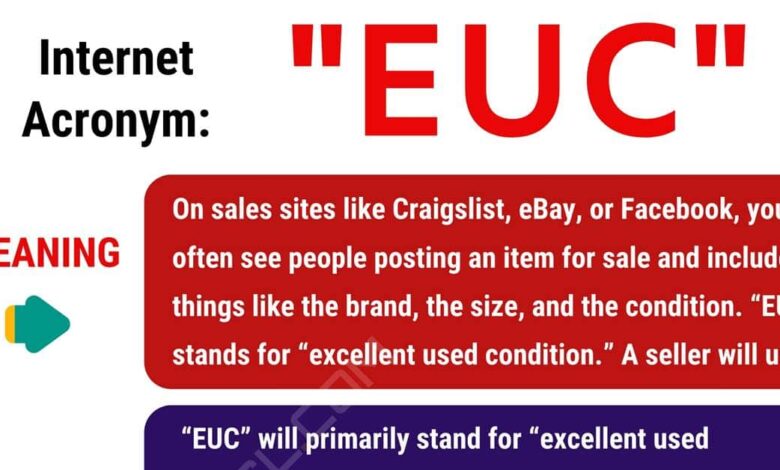
euc meaning (EUC) delineates computer systems and platforms designed to empower non-programmers in crafting functional computer applications. It comprises a spectrum of strategies aimed at enhancing the engagement and integration of end users and other non-programmers in the realm of computing systems development. etc meaning is expansive and may encapsulate various connotations, all interconnected, with the overarching goal of enabling end users to exert greater command over their computing environment, devoid of reliance on bona fide programmers or developers. For instance, an accountant might leverage Microsoft Excel to autonomously automate tasks, exemplifying the essence of our meaning.
euc meaning -user computing encompasses every utilization of computers by non-developers, essentially referring to the end users for whom programmers create. Under this expansive definition, any computing activity unrelated to development falls within the purview of each meaning.
This multifaceted concept can be categorized into three primary types:
Traditional music meaning: Here, end users simply utilize applications and computer systems developed by programmers to aid them in their tasks.
End-user control: In this scenario, package applications and hardware are procured for the user’s department, granting a level of control over the technology.
End-user development: This variant involves providing users with a toolkit, enabling them to customize and even create applications tailored for their own work, department, organization, or even as a marketable product.
What is our euc meaning ?
In the euc meaning of End User Computing (much meaning ), the facilitation of user entry into enterprise applications and data, unrestrained by temporal or spatial constraints, takes center stage. This feat is accomplished through the employment of one or a myriad of devices to establish a connection with the ethereal landscape of the virtual desktop infrastructure (VDI). This infrastructure, be it harbored within the confines of the enterprise’s premises or ensconced in the vast expanse of the public cloud, forms the crux of this digital odyssey.EUC extends support to a diverse array of client devices, including traditional PCs, tablets, smartphones, or thin-client terminal devices. These devices may be supplied by the enterprise or be the employees’ or users’ own, following the Bring-Your-Own-Device (BYOD) model.
Typically, each meaning demands a robust enterprise infrastructure to execute applications and manage the creation of virtual desktop ‘sessions’ when users log into the system. The backend infrastructure involves servers, high-performance storage like Flash to store desktop session images, and adequate storage and networking capabilities to handle the anticipated number of total and concurrent sessions.
As the euc meaning work landscape sees 75 million Americans working remotely, some IT industry analysts posit that EUC and VDI are becoming increasingly pivotal for enterprise IT. There’s a prevailing belief that the conventional desktops may evolve, or even cease to exist, supplanted by thin client devices.
Undoubtedly, euc meaning Vproves invaluable, especially in the midst of the ongoing pandemic, where many employees lack physical access to their customary work computer setups. Over the past decade, knowledge workers have embraced high mobility, and various professionals, from CAD/CAM designers to developers and line of business users, now find themselves needing to access enterprise resources remotely. In this scenario, IT heavily relies on euc meaning and VDI to furnish on-premises-like performance, ensuring a satisfactory user experience, regardless of the device in use at any given moment.
euc meaning & Advantages?
In the realm of End User Computing platforms, Microsoft, etc meaning stands as a ubiquitous exemplar – easily accessible, swift, adaptable, and ingrained in familiarity. As time has unfolded, these End User Computing systems have evolved into indispensable tools for myriad financial operations, enabling users to swiftly and adeptly handle and manipulate data. Consequently, in the face of dynamic regulatory landscapes, End User Computing proves to be a valuable asset.
Amidst the transformative waves in the working environment, the prominence of End end-user computing extends to organizations with dispersed offices and users embracing Bring Your Own Device (euc meaning) policies. This ensures the continuity of business operations, even in scenarios where organizations must pivot their activities beyond the confines of traditional office spaces.
The allure and significance of End User Computing lie in its accessibility and pivotal role in business frameworks, yet these very attributes render them challenging to govern and regulate. Unlike their traditional counterparts, End User Computing applications operate outside the purview of conventional monitoring. Frequently, the oversight of management falls short of comprehending the extent to which End User Computing integrates into the fabric of the company. Thus, the advantages that End User, etc meaning offers have, paradoxically, begun to pose risks to businesses reliant on them.
What are the benefits of each meaning?

End User Computing (euc meaning ) unfolds a multitude of advantages, encompassing not only substantial cost savings but also efficiency enhancements and augmented mobility.
From a security standpoint, EUC boasts several merits. Primarily, sensitive data avoids dwelling on the end-user device, instead always being accessed directly from the application server. Even in the event of a lost or pilfered device, access to corporate information remains constrained, assuming meticulous device access controls and the absence of network application credentials inscribed on a smartphone’s sticky note. This methodology obviates the necessity of considering devices in the realm of backup or disaster recovery plans, given that no business-critical applications or data find a residence on the device itself.
In the realm of mobility, EUC liberates employees and users to bring forth their own devices (BYOD). Save for engineering workstation terminals, devices owned by employees generally suffice to access enterprise applications, offering a gratifying end-user experience.
This resolves a myriad of issues for businesses. Principally, the responsibility of providing and provisioning client devices transforms into a user-centric challenge rather than an enterprise IT quandary. In reality, employees exhibit a penchant for selecting their own devices, particularly in the realm of smartphones.
This sentiment extends to device euc meaning as well; what was once an IT predicament now rests on the shoulders of the retailer or carrier who lent the device to the end user. IT involvement is predominantly confined to addressing logins into remote desktop sessions and troubleshooting application performance or functionality issues.
euc meaning , the overall management burden undergoes a reduction when all facets, from application installation to user provisioning to OS upgrades, converge in a singular domain. IT can then dedicate its attention to the business of crafting revenue-positive applications, rather than expending resources on disseminating OS updates across a spectrum of Windows, Mac, iOS, and Android phones, tablets, and laptops.



